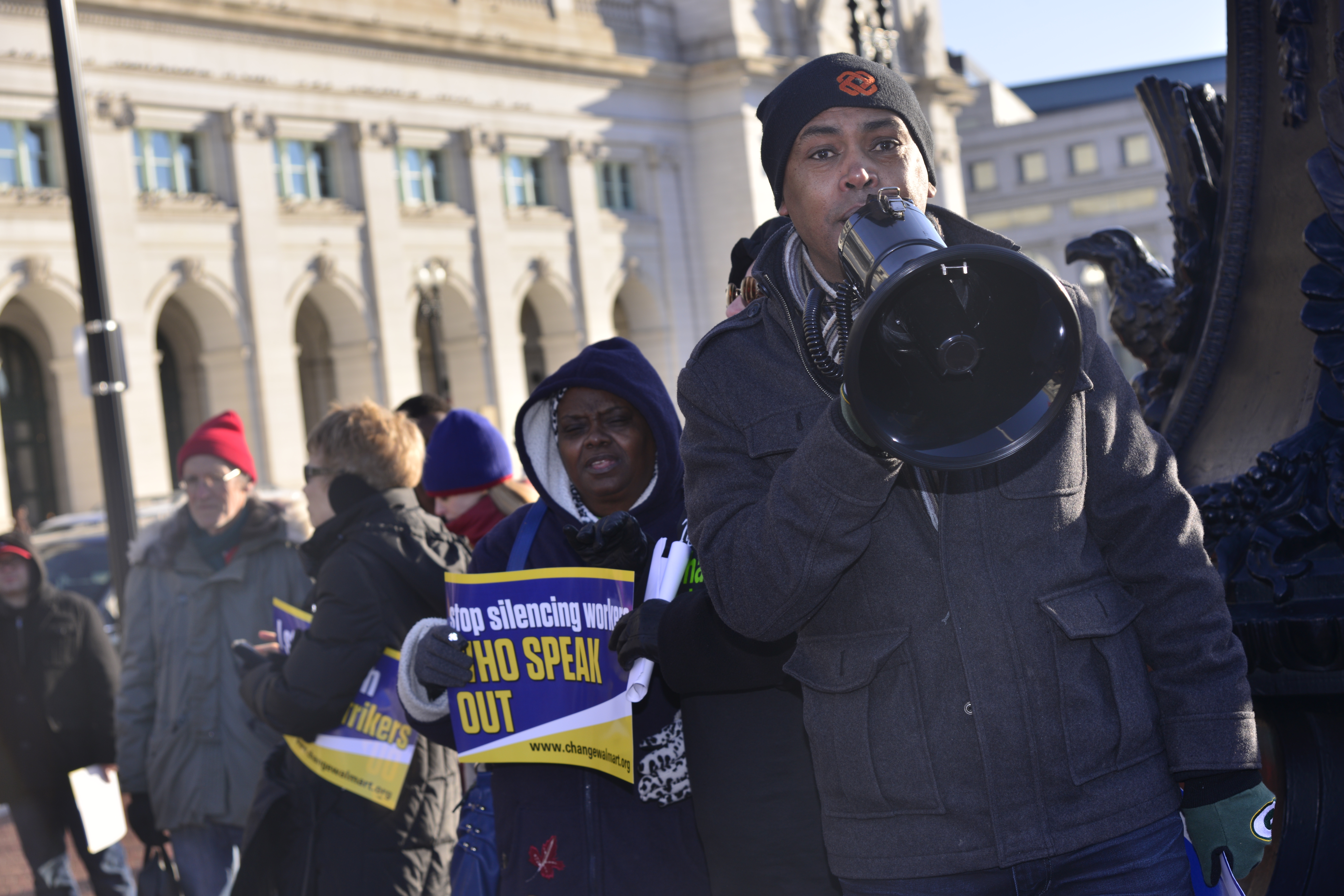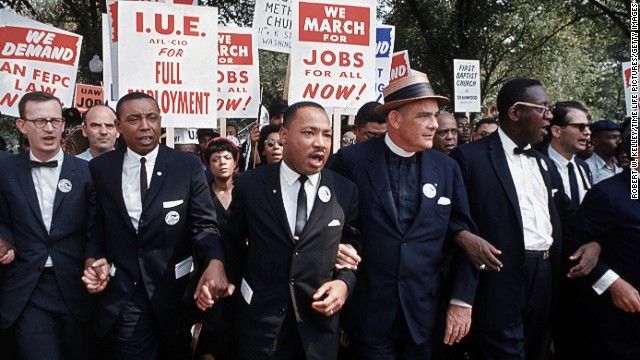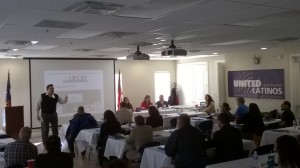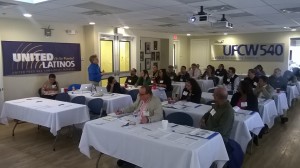February 19, 2015
UFCW Members Celebrate Defeated Kentucky Right to Work Legislation
Last week, in front of a standing room only crowd filled with UFCW members in gold, a Kentucky House committee defeated right to work legislation. A great deal of work from UFCW members in Kentucky went into this victory.
For weeks, UFCW members have traveled to Frankfort to speak with their legislators and educate them about the pain a right to work law would bring to working families in Kentucky. Just before the right to work measure failed, Caitlin Lally from UFCW Local 227 gave an impactful testimony to the committee.
“There are hundreds of thousands of workers all across Kentucky looking to this committee to do the right thing,” said Lally. “Let’s pursue an agenda to make Kentucky stronger. Let’s continue to build a state where businesses grow, workers succeed, and families thrive. Let’s resist the influence of outsiders and come together in the proudest traditions of our state. Let’s defeat right to work.”
With right to work laws currently being proposed in numerous state legislatures, this victory in Kentucky should not go unnoticed. Workers need more money in their pockets, but people in right to work states earn $5,000 less per year. Workers want to send their children to successful schools, but right to work states spend 31.3 percent less per pupil on education. Workers deserve to feel safe at work, but right to work states have a workplace death rate that is over 54 percent higher.
This win in Kentucky shows that workers who stick together, whether it’s inside their workplace or the State Capitol, can shape a better future for themselves and their families.
February 19, 2015
UFCW Local 1564 Members Fight to Defeat Right to Work in New Mexico
On February 12, nearly 100 members of UFCW Local 1564 traveled to the New Mexico State Capitol in Santa Fe to lobby their legislators against right to work legislation. During meetings with key senators, UFCW members made the case that right to work would have a severely negative impact on New Mexico.
“Right to work would allow companies to lower wages,” said UFCW Local 1564 member Andre Leger, who works at Smith’s. “It’s an attack on workers who are already struggling to make ends meet.”
Annette and Mark Ayers, along with their adult daughter, all work at Smith’s and are all members of UFCW Local 1564. “Workers need to have a say in their own future,” Mark said. “That is why we are here.” “We work at a lower rate than the rest of the country and right to work would make wages even lower,” said Annette. “Our state simply cannot afford that.” Annette added: “We have a single daughter who works for Smith’s. She’s able to pay for her own apartment, afford a car, and get the basics in life. If right to work passed, she’d be living in our house.”
Several members talked about the importance of the UFCW being represented in the halls of the Captiol. “If you don’t say anything about how you feel, you almost always lose,” said UFCW Local 1564 member Alek Dewispeleare, who works at Smith’s. Fellow UFCW Local 1564 member and Smith’s worker Mark Sokolowski agreed: “I’ve been a union member for over 30 years,” he said. “No one forced me to join. I’ve been able to support my family. I won’t stand by and let career politicians take that away.”
Annette Ayers talked about the emotion of the Lobby Day. “When my senator told me he was against right to work, my eyes filled with tears,” she said. “It gives you hope that there are people truly working for you.”
February 17, 2015
Black History Month: 50th Anniversary of the Immigration and Nationality Act
Fifty years ago at the height of the civil rights movement, our country’s immigration policy was radically changed. The Immigration and Nationality Act, also known as th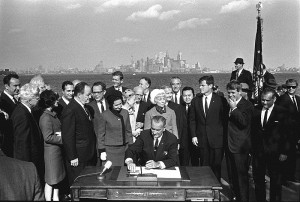 e Hart-Celler Act, abolished the national origins quota system which favored some Europeans and excluded Asians and Africans and established a new immigration system that focused on attracting skilled labor to the United States and reuniting immigrants with their families.
e Hart-Celler Act, abolished the national origins quota system which favored some Europeans and excluded Asians and Africans and established a new immigration system that focused on attracting skilled labor to the United States and reuniting immigrants with their families.
The 1965 law, which opened the door to immigrants from Asia, Africa and Latin America and changed the demographic makeup of our country, was signed by President Johnson at the foot of the Statue of Liberty on October 3, 1965. An excerpt from President Johnson’s speech is as follows:
This bill says simply that from this day forth those wishing to immigrate to America shall be admitted on the basis of their skills and their close relationship to those already here.
This is a simple test, and it is a fair test. Those who can contribute most to this country–to its growth, to its strength, to its spirit–will be the first that are admitted to this land.
The fairness of this standard is so self-evident that we may well wonder that it has not always been applied. Yet the fact is that for over four decades the immigration policy of the United States has been twisted and has been distorted by the harsh injustice of the national origins quota system.
Under that system the ability of new immigrants to come to America depended upon the country of their birth. Only 3 countries were allowed to supply 70 percent of all the immigrants.
Families were kept apart because a husband or a wife or a child had been born in the wrong place.
Men of needed skill and talent were denied entrance because they came from southern or eastern Europe or from one of the developing continents.
This system violated the basic principle of American democracy–the principle that values and rewards each man on the basis of his merit as a man.
It has been un-American in the highest sense, because it has been untrue to the faith that brought thousands to these shores even before we were a country.
Today, with my signature, this system is abolished.
Today, the fight to create a fair and just immigration policy and make our country a more open place continues. It’s time to reform our country’s immigration system and create a clear and fair path to citizenship for aspiring Americans so that they can live and work without fear.
February 11, 2015
AFL-CIO Executive Vice President Tefere Gebre Honors the African-American Labor Leaders Who Have Inspired Him in His Work
Reposted from Huffington Post
By Tefere Gebre:
Every February, people across the country celebrate Black History Month. We honor the heritage and struggle of African-Americans in the United States while looking with hope towards the future. This year, I am honored to look back at organizers and activists who inspire me daily in my work as a leader in the labor movement. The history of the modern labor movement, which is positioned to speak, fight, and win on behalf of all workers, is filled with strong black figures who fought for civil and economic justice during a time when justice was not guaranteed for all.
When I arrived in the United States at the age of 15 as a refugee of war-torn Ethiopia, I struggled to take care of myself financially while also trying to focus on my academics. When I started college at Cal Poly Pomona on an athletic scholarship, I also got a job as a night shift loader for UPS as a member of Teamsters Local 396. UPS was my first union job and it opened my eyes to the world of labor and all of the trailblazing African-American organizers who had come before me.
People like Bayard Rustin who persevered in the face of threats and violence in his efforts to organize workers on behalf of the trade unionists. Despite enduring multiple arrests and beatings, Rustin continued in his work and went on to help organize the March on Washington for Jobs and Freedom alongside A. Philip Randolph, another great African-American labor leader. The March on Washington was the largest demonstration the United States had ever seen, bringing together hundreds of people in the struggle for better jobs and better lives.
Thanks to the work of activists like Rustin and Randolph, all African-Americans have moved closer to achieving the goals of justice and equality set forth by the civil rights movement. Rustin and Randolph are important examples of the positive role unions and collective action play in the African-American struggle for economic justice. Today, African-American union members earn 28 percent more than our non-union peers and are far more likely to have good benefits that help us raise families. But there is still work to be done.
Now more than ever, the struggle for civil rights must include good jobs that raise wages and an economy that works for all. Without good jobs, there is no real freedom. While African-American union members are weathering the economic downturn with the aid of collective bargaining, our non-union brothers and sisters are suffering. Today African-Americans have a 10.4 percent rate of unemployment in the United States compared to a 4.8 percent rate for white Americans.
It’s time for the next generation of leaders to take up the torch and work on behalf of all workers. I am grateful for the inspiration that past African-American leaders have left behind for me. This proud legacy continues to motivate fellow activists who are fighting for justice today. Let’s get to work and make them proud.
February 10, 2015
Show Your Fellow Union Members Some Love By Having a Union-Made Valentine’s Day
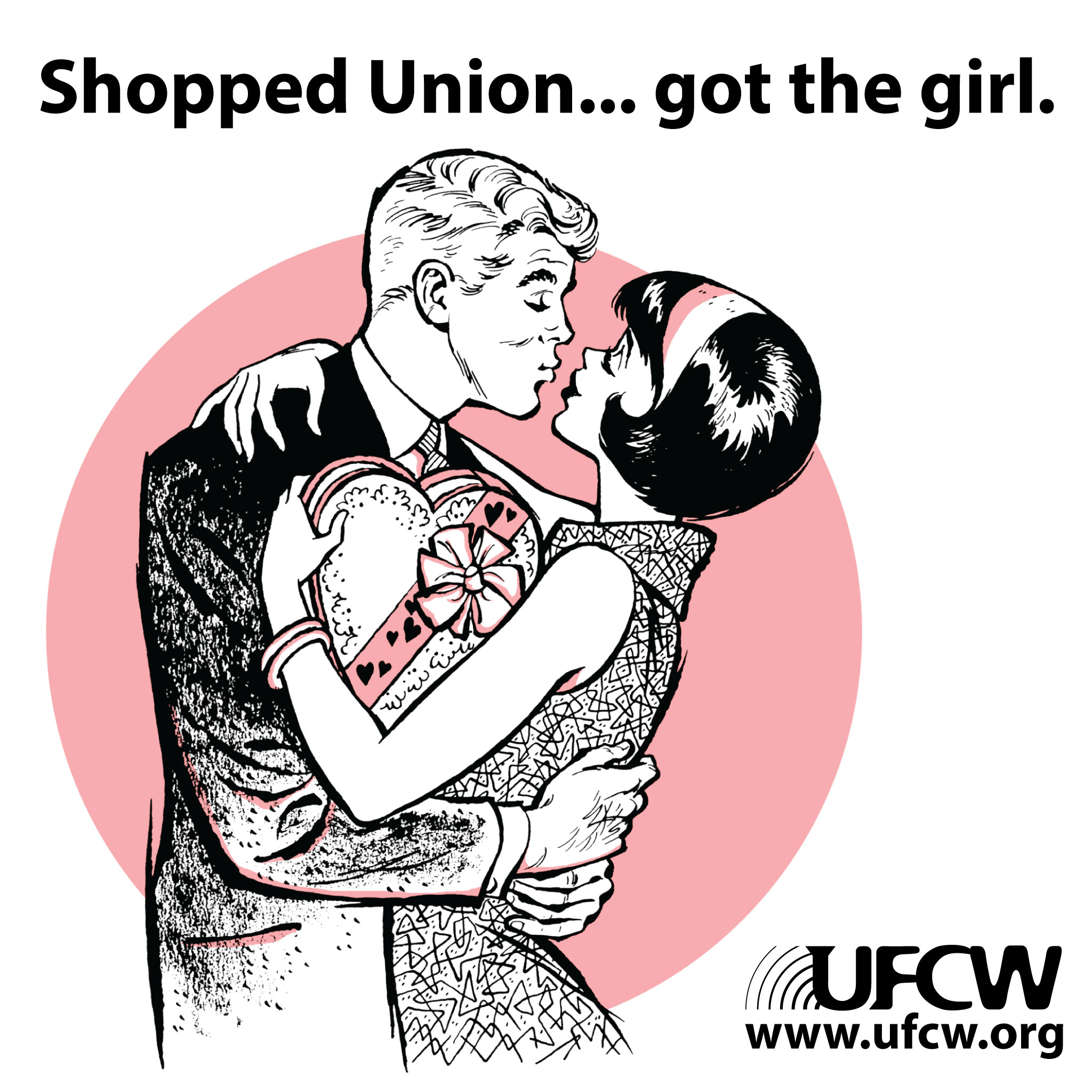 Whether you want to give your special valentine a sweet treat, find a great Valentine’s day gift for your best friend, or even satisfy your own sweet tooth this Valentine’s Day, show the hardworking men and women of the UFCW some love and support by shopping for union-made goods, or purchasing items from your favorite local union shop. We’ve provided a list of UFCW-made items below to make buying something for your sweetheart easy! You can also save 25% on Teleflora flowers and gift baskets when you use your Union Plus discount.
Whether you want to give your special valentine a sweet treat, find a great Valentine’s day gift for your best friend, or even satisfy your own sweet tooth this Valentine’s Day, show the hardworking men and women of the UFCW some love and support by shopping for union-made goods, or purchasing items from your favorite local union shop. We’ve provided a list of UFCW-made items below to make buying something for your sweetheart easy! You can also save 25% on Teleflora flowers and gift baskets when you use your Union Plus discount.
Chocolate:
- Ghirardelli chocolates
- Baby Ruth bars
- Hershey’s
- KitKats
Candy:
- Smarties
Beverages:
- Andre champagne
- Arbor Mist
- C.K Mondavi Pinot Grigio
- Turning Leaf Chardonnay
February 4, 2015
UFCW Celebrates Black History Month: Addie Wyatt
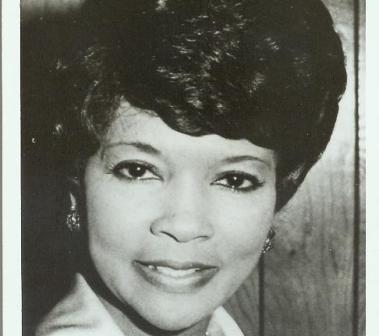 Every year, The UFCW and its members take time to remember people in our union who broke barriers, fought for justice, and paved the way for working class Americans today.
Every year, The UFCW and its members take time to remember people in our union who broke barriers, fought for justice, and paved the way for working class Americans today.
As part of our annual celebration of Black History Month, we’re looking back at beloved UFCW member Addie Wyatt’s story.
Addie Loraine Cameron, better known as Addie L. Wyatt (1924 –2012), was born in Mississippi and moved to Chicago with her family in 1930. When she was 17 years old, she married Claude S. Wyatt, Jr.
She began working in the meatpacking industry in 1941 in the canning department to pack stew in cans for the army. Due to a contract between Armour and the United Packinghouse Workers of America (UPWA), she earned more working on the packinghouse floor canning stew than she would have made working as a typist, which is what she had originally applied to be, and joined the UPWA after learning that the union did not discriminate against its members.
In 1953, she was elected vice president of UPWA Local 56. In 1954, she became the first woman president of the local, and was soon tapped to serve as an international representative. She held this position through the 1968 merger of UPWA and the Amalgamated Meat Cutters and Butcher Workmen until 1974, when she became director of the newly formed Women’s Affairs Department. In 1970s, she became the first female international vice president in the history of the Amalgamated Meat Cutters and Butcher Workmen and later served as director of its Human Rights and Women’s Affairs and Civil Rights Departments. She served as the first female African American international vice president of the UFCW after Amalgamated and the Retail Clerks International Union merged in 1979.
Addie’s work for the union as well as in her community played an integral role in the civil rights movement, and she joined Dr. Martin Luther King, Jr. in major civil rights marches, including the March on Washington, the march from Selma to Montgomery, Alabama, and the demonstration in Chicago. She was one of the founders of the Coalition of Labor Union Women, the country’s only national organization for union women. She was also a founding member of the Coalition of Black Trade Unionists and the National Organization of Women.
In 1984, Addie Wyatt retired from the labor movement as one of its highest ranked and most prominent African American and female officials. In honor of her work, she was named one of Time magazine′s Women of the Year in 1975, and one of Ebony magazine′s 100 most influential black Americans from 1980 to 1984. The Coalition of Black Trade Unionists established the Addie L. Wyatt Award in 1987. She was inducted into the Department of Labor’s Hall of Honor in 2012.
Addie’s life is a perfect example of how labor rights are civil rights. At her job, in the union, and throughout all aspects of her life, Addie fought to break barriers for women’s equality, strived to better working conditions, and campaigned for fair treatment of all people, no matter what one’s race. Addie is just one of the many UFCW examples that still inspire members today, as they march on the front lines of social justice, and spread the word about sticking together for a voice on the job.
February 2, 2015
UFCW Celebrates Black History Month
This week marks the beginning of Black History Month–a time to remember and celebrate the rich history of African Americans and the achievements of the civil rights movement.
Black History Month dates back to 1926, when historian Carter G. Woodson and other prominent African Americans dedicated the second week in February as “Negro History Week” to coincide with the birthdays of Abraham Lincoln and Frederick Douglass. In 1976, the celebration was officially recognized and expanded and every U.S. president since then has celebrated Black History Month during the month of February.
This month, the UFCW will highlight milestones in the civil rights movement—including the 50th anniversaries of the march from Selma to Montgomery and the Voting Rights Act. We will also pay tribute to African American labor leaders who fought for fair wages, dignity in the workplace, and the freedom to organize in spite of considerable barriers, and honor their significant contributions to the labor movement.
January 30, 2015
UFCW Intl President Marc Perrone on Safeway Albertsons Merger
 (WASHINGTON, D.C.) – Marc Perrone, International President of the United Food and Commercial Workers International Union (UFCW), today released the following statement in response to Safeway’s merger with Albertsons:
(WASHINGTON, D.C.) – Marc Perrone, International President of the United Food and Commercial Workers International Union (UFCW), today released the following statement in response to Safeway’s merger with Albertsons:
“More than 250,000 Safeway and Albertsons workers are members of the United Food and Commercial Workers Union (UFCW). UFCW members also work for several other Cerberus Capital Management-operated supermarkets across the country, including Albertsons, Acme, Jewel-Osco and Shaw’s.
“UFCW members have a history of negotiating union contracts with Safeway, Albertsons and Cerberus Capital Management. Together in their union, these workers have been able to ensure that union grocery jobs are the best jobs in the industry with fair pay, decent benefits, and job security – all the while ensuring that their companies are able to be profitable and successful.
“UFCW members in California stores that were divested by Albertsons are pleased to learn that the grocery store chain Haggen will acquire many Albertsons stores in California. Haggen workers in the Pacific Northwest are also members of the UFCW. UFCW members across the country are looking forward to working with Safeway, Cerberus, and Haggen on issues that pertain to the members and industry. Our members plan to continue to serve their customers and their communities with pride.”
January 28, 2015
UFCW Local 540 Hosts Immigration Workshop
On January 23-25, UFCW Local 540 hosted an immigration workshop and informational session with more than 50 attendees as part of the UFCW’s Union Citizenship Action Network (UCAN). During the workshop, participants discussed President Obama’s recent executive action on immigration known as Deferred Action for Parents (DAP), along with learning about the naturalization process and Deferred Action for Childhood Arrivals (DACA). The session was run by UFCW Executive Vice President and Director of the Civil Rights and Community Action Department Esther López.
In November, the President put the DAP program in place to remove the threat of deportation for parents of U.S. citizens and legal permanent residents. Many UFCW local unions are hosting similar forums to help members determine whether they qualify, gather necessary documentation, prescreen their applications, and answer important legal questions.
The naturalization and citizenship part of the training provided participants with the platform to learn about the critical skills and tools needed to assist eligible UFCW members and their families to go through the naturalization process to become U.S. citizens. In addition to learning about the naturalization process, participants were also trained to provide assistance to workers or their family members who qualify for immigration benefits under the Obama Administration’s June 2012 memorandum on DACA.
For more information about DAP, visit www.ufcw.org/immigrationaction. If you are interested in sample documents that can help in this process, please contact Amy Gray atagray@ufcw.org. In addition, DAP flyers in English and Spanish are available on the UFCW Political Toolkit at www.ufcwtoolkit.com.
If your local union is interested in hosting a training or taking advantage of upcoming immigration training opportunities, please contact Eduardo Peña at epena@ufcw.org.
January 20, 2015
President Obama Urges Strengthening of Unions in His 6th State of the Union Address
 Last night, UFCW members gathered around televisions, logged on to their computers, or followed along on their tablets and smart phones as President Obama delivered his State of the Union Address.
Last night, UFCW members gathered around televisions, logged on to their computers, or followed along on their tablets and smart phones as President Obama delivered his State of the Union Address.
President Obama unveiled a number of proposals aimed at strengthening working and middle class Americans. They included:
- Strengthening unions and building more worker protections, such as maternity leave and seven days of sick leave for all.
- Two free years of community college.
- A call for affordable high-speed internet access.
- A plan that would provide tax breaks to working and middle class families, paid for by closing loopholes and deductions commonly used by the wealthiest Americans.
- Providing affordable, high quality childcare for working parents.
As they consumed the speech, UFCW members reacted through texts and social media to what they were hearing, and what else they hoped to see the President mention:
“Raise the minimum wage. Give more tax breaks to households making under 100K a year.” –UFCW Local 8 member
“It’s important for everyone to have the freedom to bargain collectively!” –Pat Preston, Local 400 Member
“The backbone of a strong economy is the working families of the middle class.” –Donovan Jurss
“‘Right to work’ laws lower our standard of living.” –Andrew Meyers
“It’s time for working families to stop carrying the 1% on their backs! The wealthy and big business must pay their fair share!” –Shirley Bennet, Local 75
“Cap CEO salaries.” –Margaret Wolf, Local 75
“We need flexible schedules without penalty of pay loss.” –Maria Rose
“Why do working families need to work 2 to 3 jobs to survive? What happened to the ‘full-time’ job?” –Todd Walters
The economy has improved in six years, but UFCW members are still not feeling the full effects. Worker pay is not growing fast enough, income inequality is rampant, and a college education remains difficult to afford. These issues and more need to be addressed on Capitol Hill and inside State Houses before the state of our union can be considered truly strong.



